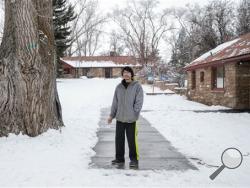PORTLAND, Ore. (AP) — David Fry, a college dropout from Ohio, had a taste of fame as the last occupier of a federal wildlife refuge in Oregon.
Fry became one of the public faces and voices of the standoff at the Malheur National Wildlife Refuge, using a digital camera to broadcast his commentary as an armed band of anti-government protesters held onto the remote federal property for 41 days this winter.
Fry threatened to kill himself, declared war on the U.S. government, asked for marijuana and pizza, and talked about UFOs before he finally walked into federal custody. On a YouTube channel called DefendYourBase, Fry posted videos of himself and the other three final holdouts, taunting federal authorities and refusing to give up as they huddled in their makeshift camp area, drinking beer and trying to keep warm under tarps by a campfire.
Even jail hasn't stopped Fry from talking.
While he awaits trial on federal charges, Fry has been calling from inside the Multnomah County Jail to have his thoughts recorded and posted by supporters to YouTube. He has complained about the cost of his audio updates — $15 for 15 minutes for each call from jail. But that hasn't stopped him from making a grab-bag of pronouncements — denouncing the FBI, quoting the Bible, explaining how Easter is really a pagan ritual and warning about supposed government conspiracies.
Fry, one of 26 people charged with federal crimes for the standoff in remote southeastern Oregon, has pleaded not guilty to conspiracy to prevent federal employees at the refuge from doing their work, possession of a firearm at a federal facility, and carrying a weapon in the course of a crime of violence.
Now he wants pre-trial release, arguing that he's is not a threat to society and never endangered anyone.
The judge has not been persuaded. "I look at you as a vulnerable person," U.S. District Judge Robert E. Jones told Fry, citing concerns about his mental stability in turning down his latest release request.
William Fry Jr., a board member of his county's tea party, argues that there is no better place for his son than their home in Ohio. "We'd prefer he was at home, to support him and occupy his mind with love and compassion, rather than sitting in a cell," the father told The Associated Press after the hearing in Portland, Oregon.
According to his father, Fry, 27, had dropped out of Wright State University and was living with his parents in Blanchester, Ohio, trying various jobs and smoking pot for "medicinal" purposes, when Ammon Bundy and his followers seized the Oregon refuge on Jan. 2. The armed band seemed to be itching for a confrontation as they protested prison sentences for two local ranchers convicted of arson, and promoted their disdain for federal control of public lands.
David Fry, who describes himself in his recordings from jail as a "faithful watchman" guided by a divine power, says he felt called to join the occupation by a "female voice." He said he had been depressed, unhappy in his job as a dental assistant, and felt the need to go to Oregon "for my own salvation."
Fry had already become an online acquaintance of one of the occupation's leaders, Robert "LaVoy" Finicum, and he was thrilled at the chance to meet him in person. But Finicum was soon dead — killed in a Jan. 26 confrontation with FBI agents and Oregon State Police that also resulted in the arrest of Ammon Bundy and others.
Most of the occupiers fled when Finicum was killed and the other leaders were arrested. Fry remained at the refuge along with married couple Sean and Sandy Anderson of Idaho and Jeff Banta of Nevada, refusing to leave without assurances that they could go free.
Instead, FBI agents tightened their circle and ordered the holdouts to surrender. The Andersons and Banta gave up the next morning. Fry eventually gave up, too, but not before his live-streamed tirade in which he threatened to kill himself and rambled on about topics unrelated to the occupation.
This is not Fry's first time behind bars. In one of his recordings from jail in Oregon, Fry talks about trying to commit suicide by hanging when he was 18 and in jail in Ohio.
William Fry described that 2009 episode as well, telling the AP that it began when he called a mental health unit after noticing his son "acting odd," with a "very distant stare" and a face that was "gaunt looking ... expressionless."
Fry was ordered into 72-hour hospitalization, but he fled the hospital, was caught and put in jail, his father recalled. He said he still doesn't know what caused the behavior, but wondered at the time whether his son had "smoked some pot that was laced with something."
The elder Fry said he sympathizes with the occupiers' complaints about government overreach, and he thinks the charges against them are excessive.
But he said he had tried to talk his son out of joining the occupation. He remembers thinking at the time: "What are those people going to do with my kid?"

